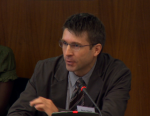Jean-Marie BIJU-DUVAL
contribution 10 -
Biju-Duval Jean-Marie

transtlated version
Thank you. My name is Jean Marie Biju Duval. I am a lawyer in Paris. I was a Defence lawyer in the Media trial, and now I am a Defence counsel for Lubanga in the ICC trial. And since we were trying to draw lessons from the transition from ICTR to ICC, I would like to speak along the lines of Ms. Becky’s statement and the statement made by Mr. Stewart in respect of a crosscutting issue which spans several areas.
The issue of the secrecy in terms of protection of witnesses, the issue of secrecy of confidentiality in respect of testimonial evidence, and the matter of confidentiality is pretty sensitive. And it had been in the ICTR, and it’s all the more quite an issue in the ICC because the protection of witnesses, which is legitimate, has a lot of consequences on the conduct of the trial and especially the sittings in public sessions of the Court.
The measure taken to protect the witness is, you know, shrouding the witness’s identity in secrecy. I am not referring to Prosecution witnesses. The Defence is aware of the identity of the witness on the stand. But concealing the identity of the witness from the public so as to protect the witness, yet we have had instances at the ICTR where the rule was open sessions when witnesses testified in full view became the exception. And the concealment of the witness’s identity to the public, which became common practice, which may have may still be common practice I left Arusha quite some years ago is quite a source of concern.
In the first trial before the ICC against Mr. Thomas Lubanga, the Prosecutor who is coming to the end of his case, called about 30 witnesses. And out of the 30 witnesses, only 3 witnesses testified in full view to the extent that the identity was fully known to the public. So it’s not only the identity of the witness which is concealed, because the parties are duty bound not to raise any questions in public or matters which tend to reveal identifying information about the witness. That is in concrete terms.
A significant part of the proceedings, sometimes half, sometimes less, is conducted in closed session. So it is not only the identity of the witness that is veiled, but the witness’s testimony is veiled also so as to prevent disclosing the witness’s identity.
And I think this is an issue to be raised in respect of drawing lessons for international justice today and tomorrow. What do we have to do? I don’t have an answer. But we just need to highlight the importance and the urgency of resolving this matter by reconciling the protection of the witness and ensuring the public nature of hearings, because today there are trials that can only be followed by those who are actually in court in the proceedings. And I believe FranÁois, who will take the cue to talk about documentary evidence.
The issue of confidentiality equally affects documentary evidence, disclosure of documentary evidence to the Defence. There is also the issue of confidentiality. It is legitimate with regard to persons, protection of a secret that may be in the interest of an international organisation of a state or a state institution.
Confidentiality, in my opinion, has gained such broad proportions that even in the area of testimony, documents to be presented at disclosure are selected. And even if in those documents that are selected and disclosed, there is still concealment. Today we’ve talked of redacting, redacting some elements of information in those documents. So I just wanted to moot that issue which I consider essential and which goes directly to the value of justice which accords a disproportionate rule to confidentiality.
J.M. SOREL
Thank you very much for highlighting that particular aspect.
Well, I have a number of people asking me to give them the floor. So, please, just keep it brief.

